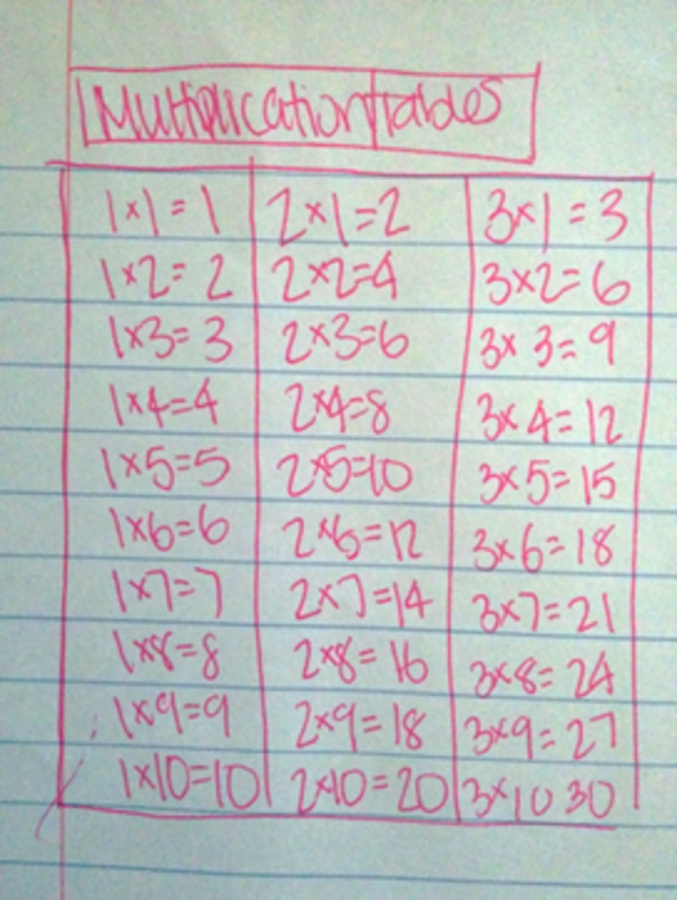Is math memorization not necessary?
Stanford education expert says number sense is better than memorizing
Photo courtesy: Adhiti Chundur
Times tables like these are drilled into our heads in elementary school. We are given a set of problems and are expected to complete them accurately within a time limit. Stress like this can erode a child’s confidence in their math skills. This can develop into a phobia, especially during elementary and middle school. So when a student reaches high school, they steer away from challenging math classes.
March 7, 2015
In elementary school, we all learned the times table, (like 8 x 3 = 24). The 100 problem timed quizzes were stressful, but being the first one to finish and flip the paper over was one of the most satisfying feelings.
Stanford Professor Jo Boaler said that math, like the times table, should not be drilled into kids’ minds. In her new paper, “Fluency Without Fear,” co-authored by Cathy Williams and Amanda Confer, they explain that simply memorizing is harmful.
“Drilling without understanding is harmful. I’m not saying that math facts aren’t important. I’m saying that math facts are best learned when we understand them and use them in different situations,” Boaler said in an interview with “The Hechinger Report.”
The paper emphasizes “Number sense,” which is the ability to work flexibly with numbers, rather than just memorize straight facts.
Ex.) Instead of just memorizing 9 x 4, work out 10 x 4, and subtract one four (40-4).
Boaler writes, “When students focus on memorizing times tables they often memorize facts without number sense, which means they are very limited in what they can do and are prone to making such errors…Lack of number sense has led to more catastrophic errors, such as the Hubble Telescope missing the stars it was intended to photograph in space.”
The students who were able to easily and quickly memorize times tables had an advantage over the kids who could not memorize as quickly in the timed tests.
Boaler’s paper states that recent brain studies found that students who could memorize facts more easily were not necessarily smarter or higher achieving than the other students.
The students who are slower at thinking out math problems are just as smart as any other student.
“When teachers emphasize the memorization of facts, and give tests to measure number facts students suffer in two important ways. “ Boaler writes.
“Sian Beilock and her colleagues have studied people’s brains through MRI imaging and found that math facts are held in the working memory section of the brain. But when students are stressed, such as when they are taking math questions under time pressure, the working memory becomes blocked and students cannot access math facts they know. As students realize they cannot perform well on timed tests they start to develop anxiety and their mathematical confidence erodes.”
Math anxiety is a problem in America. People that develop anxiety in elementary and middle school are likely to avoid taking high-level math courses in high school, and to not pursue careers in the field of mathematics.
Compared to other countries, America falls short on ranking in math. On the 2012 PISA (The Program for International Student Assessment) shows that American 15 year olds fall below average on math.
Will this new method be better and more effective in teaching students the fundamentals of math?






![Mock Trial members from Gold and Green team last year pose for a picture in front of the OCLRE building in Columbus. "We all put in so much work [last] year. I know [this] year we’ll come back improved and ready to win!” said Ogunbodede.](https://shsleaf.org/wp-content/uploads/2025/10/IMG_4121-300x205.jpg)
